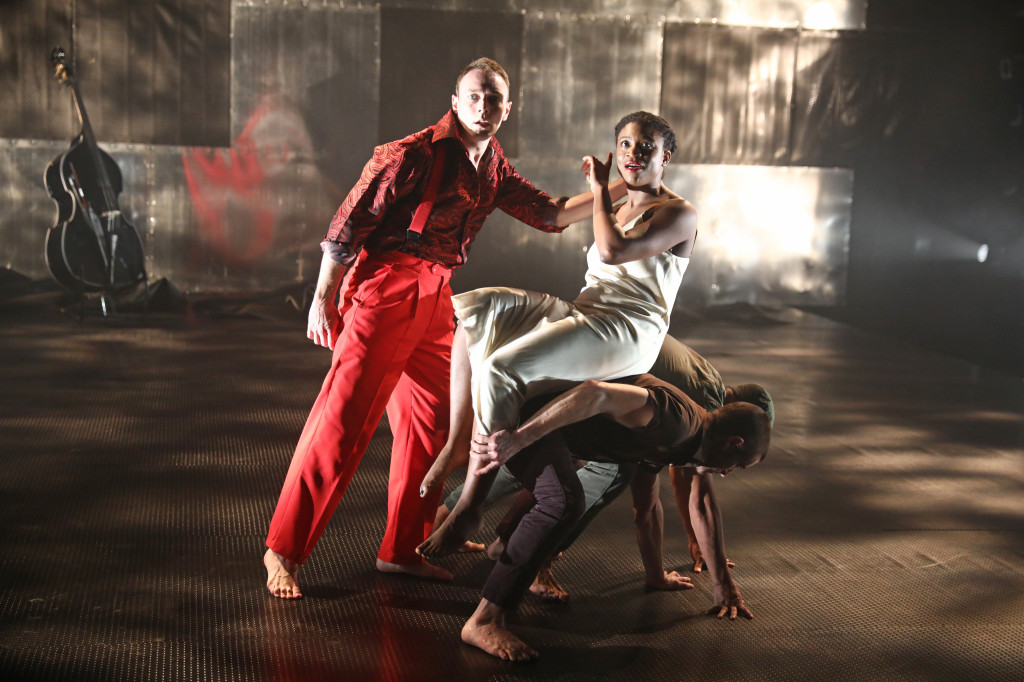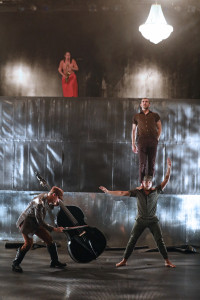Life is not a dream.
We fall down the stairs to eat the moist earth,
or we climb to the knife edge of the snow with the voices of
dead
dahlias.
But forgetfulness does not exist; dreams do not exist;
flesh exists. Kisses tie our mouths
in a thicket of new veins,
and whoever his pain pains will feel that pain forever
and whoever is afraid of death will carry it on his shoulders.
—from “City That Does Not Sleep” by Frederico García Lorca

Although I can only read it in translation, Frederico García Lorca’s poetry that makes me want to luxuriate in every line, pausing, mulling over his images and lyricism. A textured symbolist language flows through his best-known play, BLOOD WEDDING: barren soil, burning heat, cooling water; violence, desire, earth, flesh. On its face, it makes a fitting vehicle for the Wilma Theater’s HotHouse Company of actors, an in-house troupe similarly focused on using symbolic movements to express dramatic sentiment.
Directed by visiting Hungarian director Csaba Horvath, the synthesis onstage at the Wilma creates moments of severe beauty, choreographed imagery fitting Lorca’s play. But just as you’d get annoyed hearing me read a Lorca poem, the drawn-out movement-heavy staging distracts from the force of Lorca’s own symbolism and the emotional force of his characters.
Lorca wrote BLOOD WEDDING in the years before the Spanish Civil War. He would lose his life in the conflict, executed by fascists for his homosexuality and liberal republicanism. In hindsight, his imagery of Spanish earth soaked in violence, blood, and death feels prescient. .
Thom Weaver’s striking, severe black set captures this intertwining of earth and people. Thick black rugs on the floor and backdrop peel away and roll up to reveal flashes of color or light. With few props, this also serves to demarcate space—a living room where a mother (Jaylene Clark Owens) mourns the deaths of a husband and son and worries for the safety of her affianced younger son (Jared McLenigan).

Director Horvath leads an award-winning dance-theater company in Budapest, and under his direction each interaction gets heavily accented by choreographed dance-like movement. The engaged Bride (Campbell O’Hare, coming off her related Fringe piece The Bride’s a Cunt…) rolls and slithers in discomfort as a maid (Taysha Marie Canales) prepares her hair for the wedding. Her former love and “hot-blooded” admirer Leonardo (Lindsay Smiling, an ideal casting but perhaps two decades older than his romantic pairing) freezes and poses with coldness as he talks to his wife (Sarah Gliko) and mother-in-law (Canales, again).
At times, this expressionistic acting style highlights and advances Lorca’s emotional poetry (which loses some of its lyricism in Nahuel Telleria’s modern translation). We get moments of real beauty in this visually arresting production: Leonardo and the Bride climbing up a people-wall after he seizes her from the wedding party; the Groom and Leonardo holding the Bride aloft in a Christlike pose—she’s an object of worship, but also, crucified.
Often though, the affected symbolic movement bogs down the pace and overwhelms Lorca’s poetry. The interaction between Leonardo and the Bride is drawn out over many minutes as each line gets punctuated by several dance moves, bleeding the words for every drop of meaning. We feel the intense desire between Smiling and O’Hara’s characters better in scenes with only of them than when they share the stage.
Part of the problem may be that Horvath is used to choreographing on dancers, not actors. The production begins with a full-cast dance number (more inspired by Horvath’s Central European heritage than Lorca’s Iberian). The choreography is emotive, but this is a stage that plays host to the expressive, graceful, and inventive dance of BalletX. Seeing the actors dance, I’m reminded of the strained acting we see in a full-length opera or ballet when the trained singers or dancers have to act.
The thing is, Horvath and his actors clearly understand the text and communicate the story easily (though the story isn’t really the point of the piece). The meanings they bleed from the script are spot-on, but one wishes they had mined the words for meaning in overemphasized movement, then pared this back to more subtle bodily expressions.
[The Wilma Theater, 265 S. Broad Street] October 25-November 19, 2017; wilmatheater.org

Two name misspellings:
Campbell O’Hare
Taysha Canales
Thanks! Fixed.